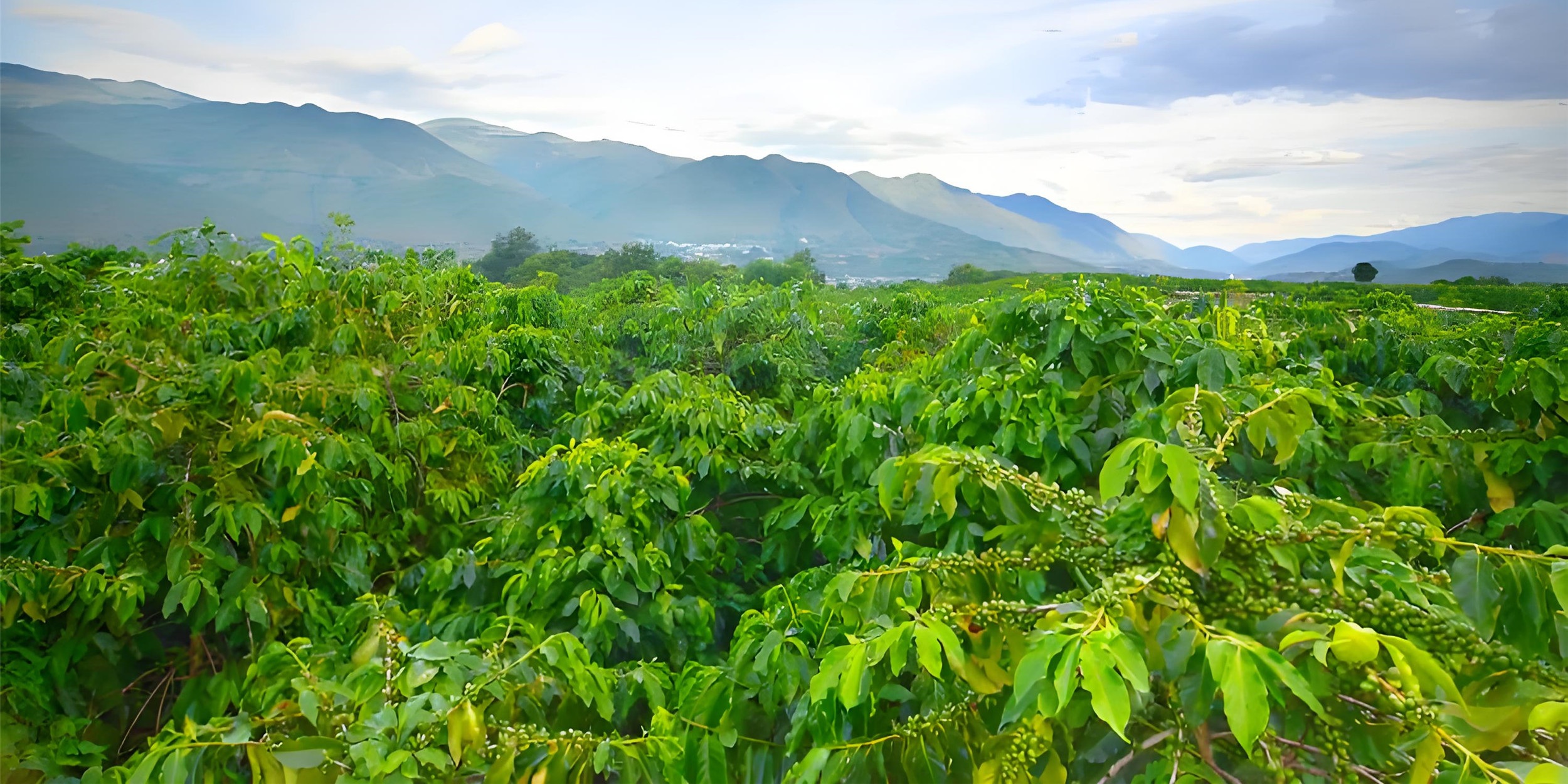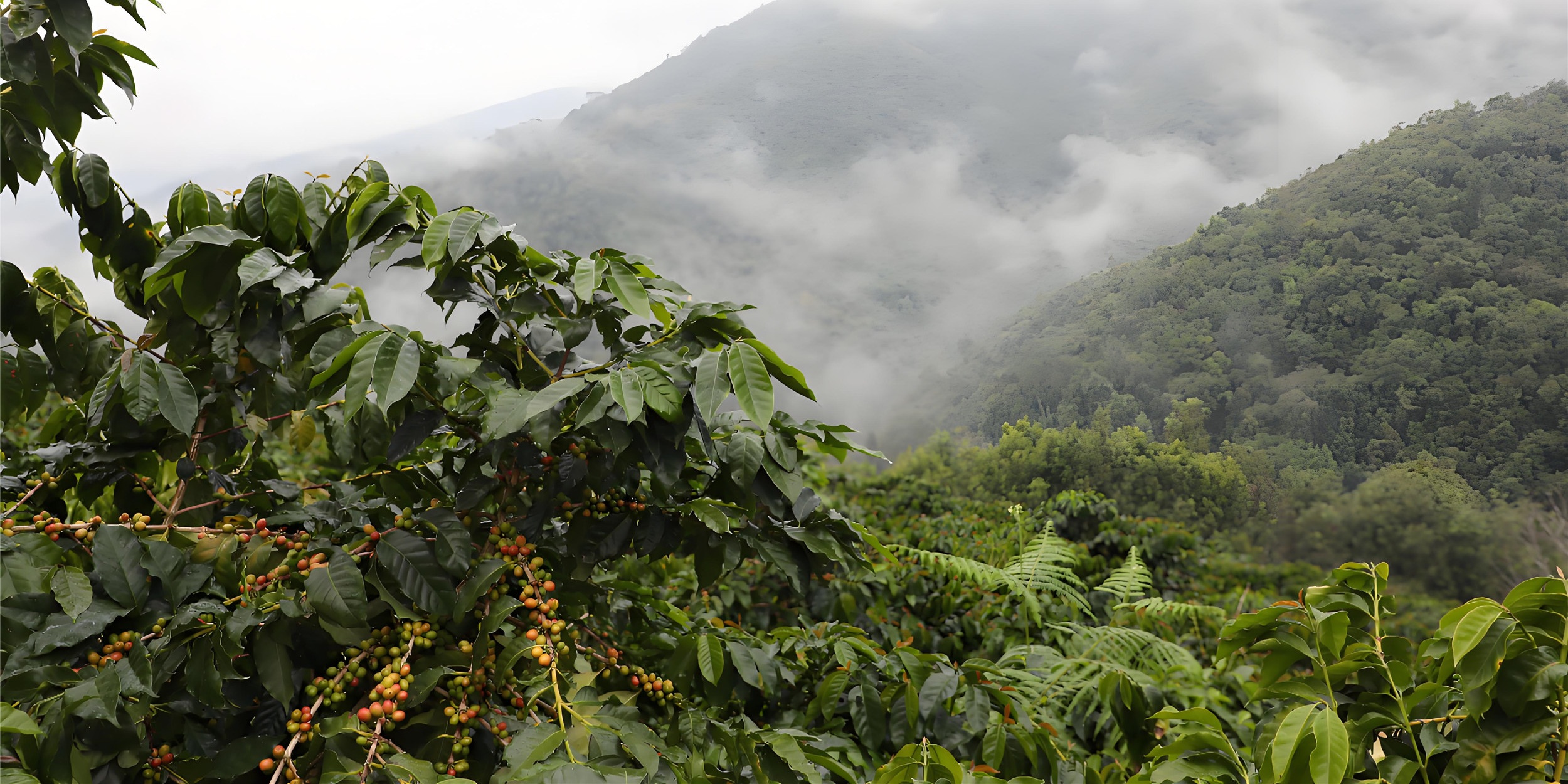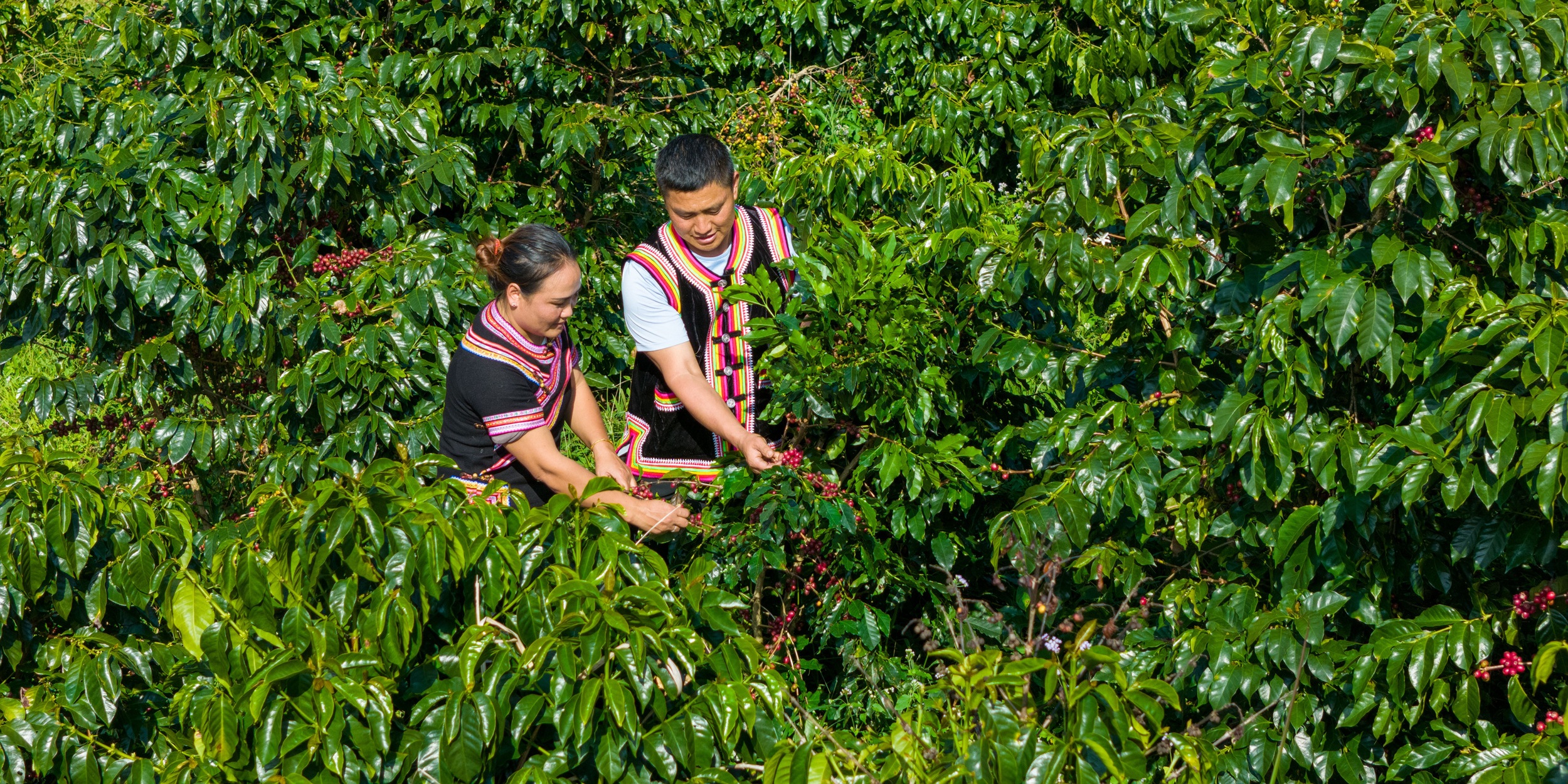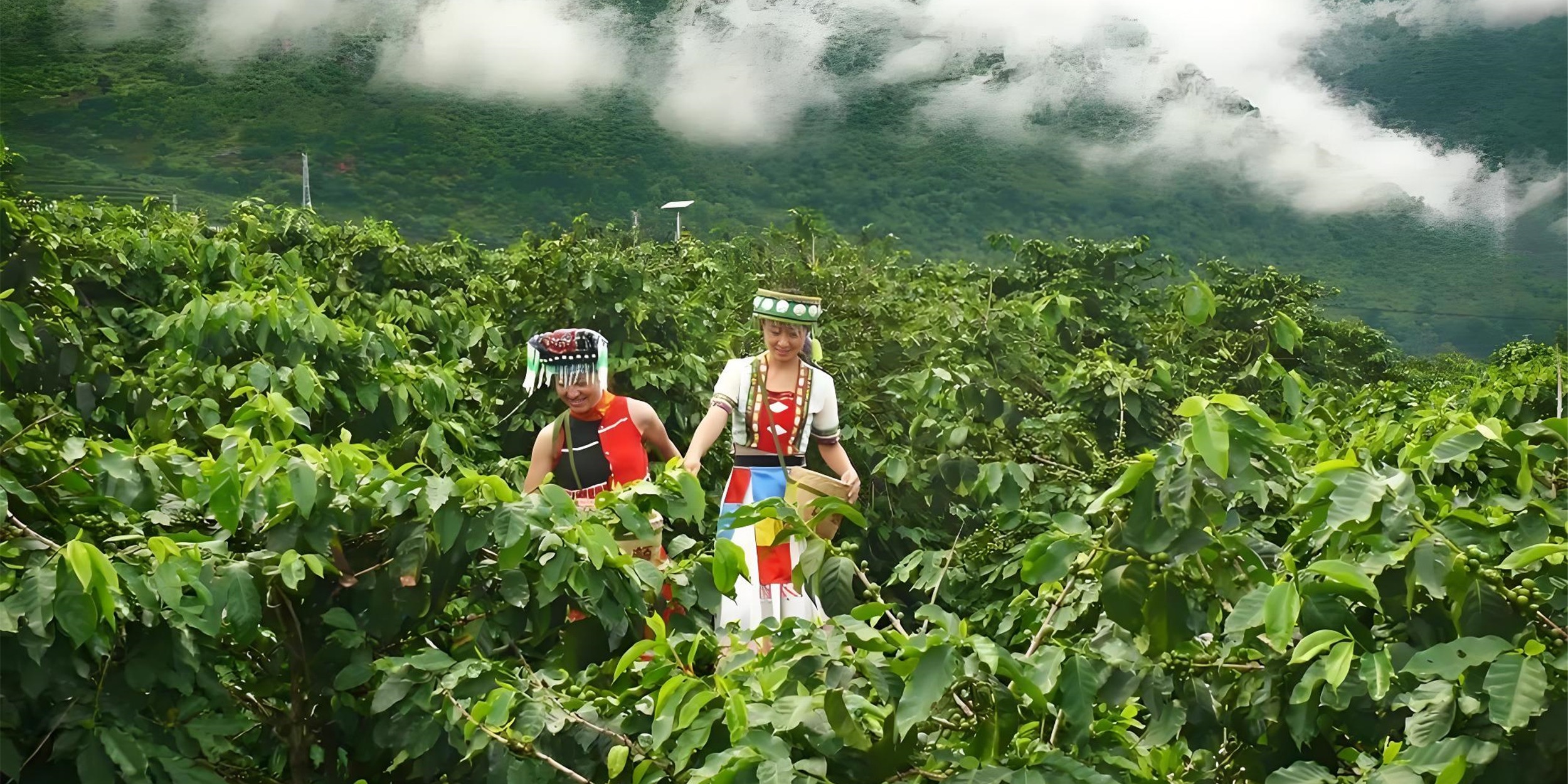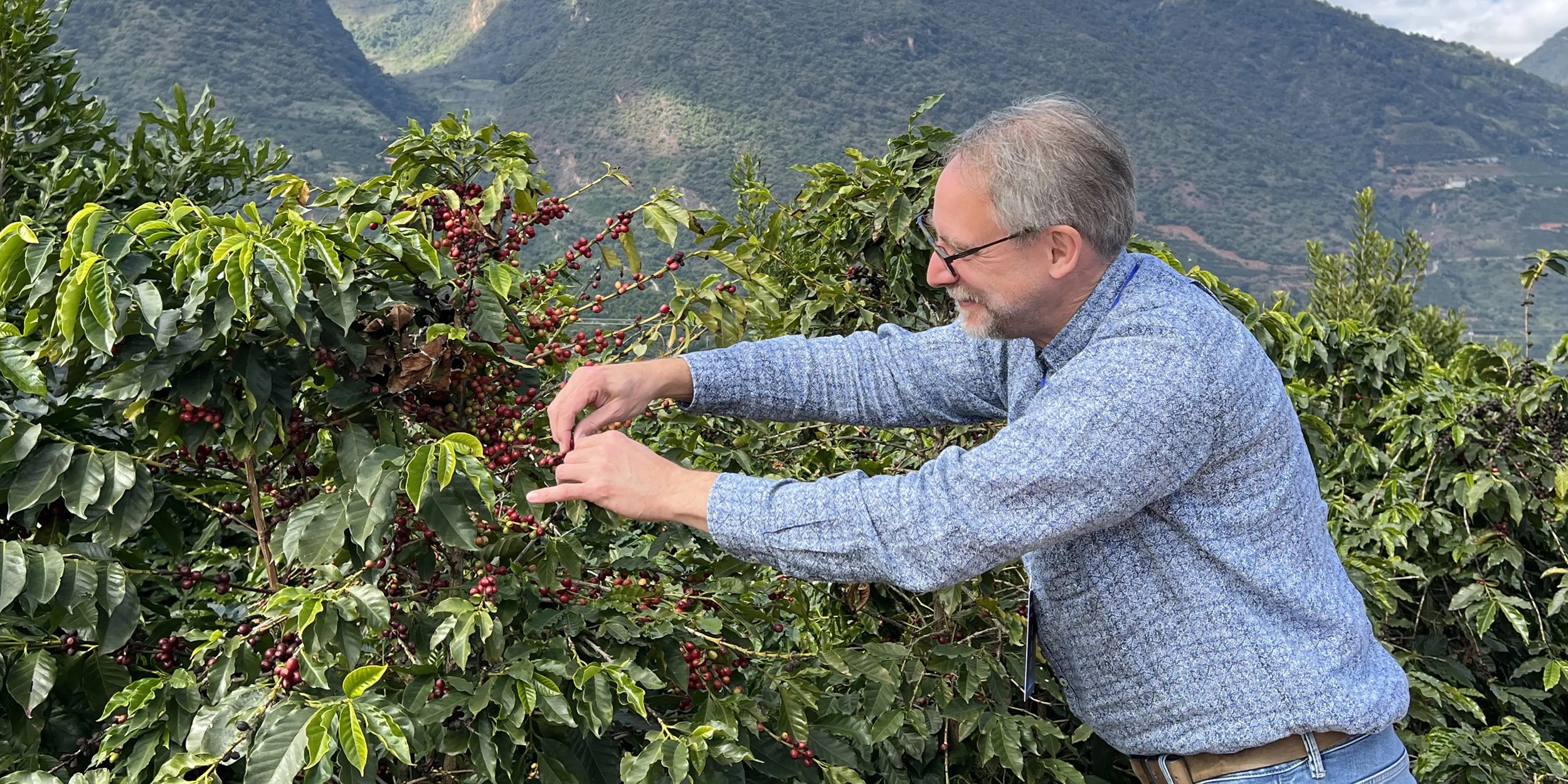彩云之南,啡香四溢:探寻云南咖啡产地风情 South of Colorful Clouds, Fragrant with Coffee Fragrance: Exploring the Customs of Yunnan Coffee Production Areas
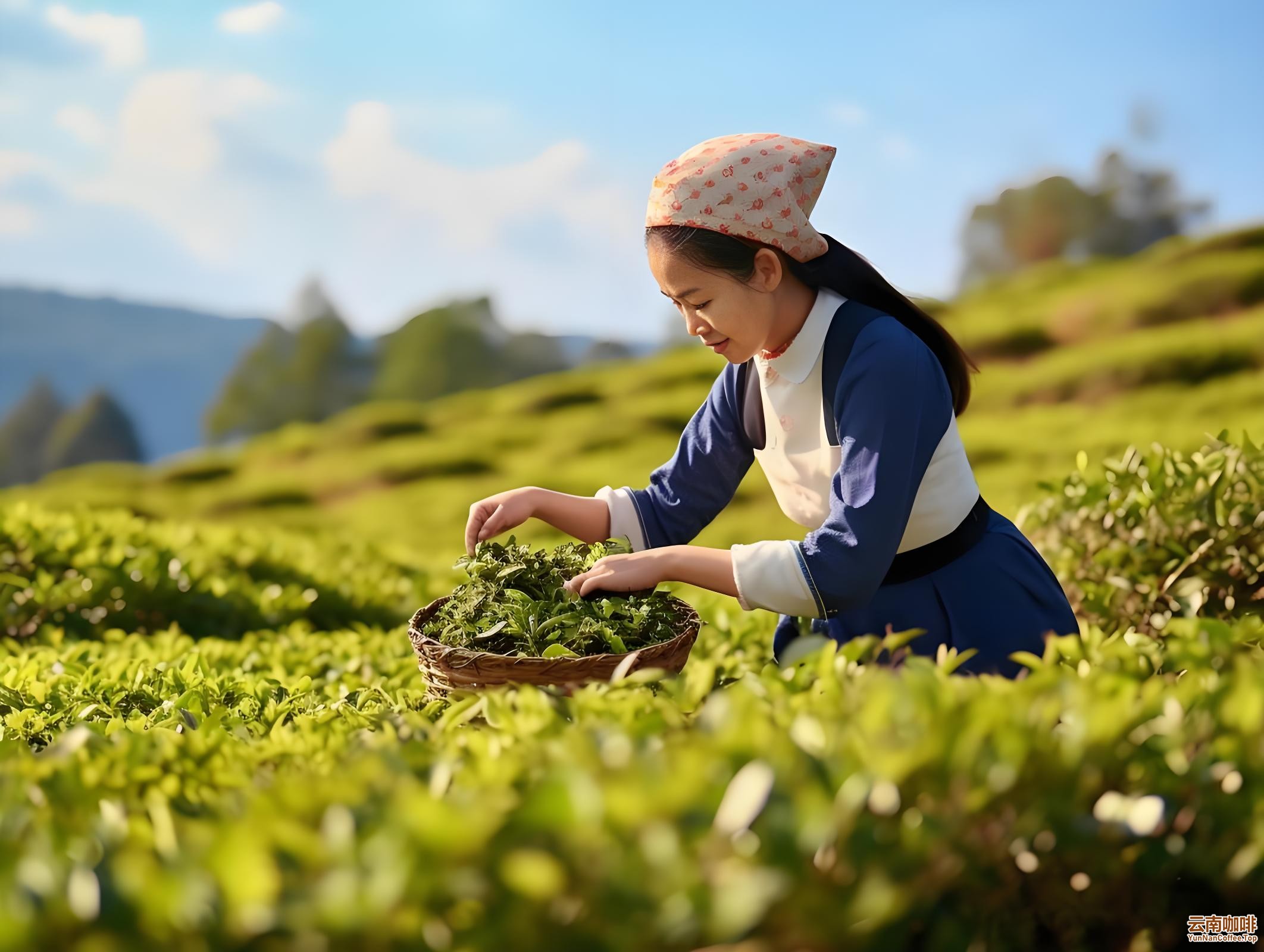
彩云之南,啡香四溢:探寻云南咖啡产地风情
咖啡,这颗源自埃塞俄比亚高原的神奇种子,在跨越千山万水后,于彩云之南找到了一片适宜生长的沃土。云南,凭借其独特的地理环境、宜人的气候条件,孕育出了风味独特的小粒咖啡,成为中国咖啡产业的摇篮和主力军。在这里,咖啡不仅仅是一种农作物,更是一种文化符号,串联起了自然、人文与产业的脉络,吸引着无数人前来探寻它的魅力。
一、溯源:百年前的种子落地生根
云南咖啡的种植历史,宛如一部跨越世纪的传奇。19世纪末,法国传教士田德能怀揣着对咖啡的热爱,将一株珍贵的铁皮卡咖啡苗引种至大理宾川县朱苦拉村。这个深藏于金沙江峡谷的彝族村寨,从此开启了与咖啡的不解之缘。在随后的岁月里,咖啡树在这片土地上悄然生长,从最初的星星之火,逐渐呈燎原之势。
朱苦拉村至今仍保留着13亩1134株古咖啡树,其中24株树龄超过百年。这些古老的咖啡树,犹如历史的见证者,静静诉说着云南咖啡的起源故事。它们不仅是中国咖啡种植的“活化石”,更是云南咖啡文化的重要象征。在当地,村民们延续着传统的种植和加工方式,手工采摘、杵臼脱壳、太阳日晒,每一道工序都饱含着对咖啡的敬畏与热爱,也让朱苦拉咖啡保留了最纯正、最原始的风味。
1952年,云南省农科院热带亚热带作物研究所的研究者们将咖啡树种子从朱古拉村带到保山市栽种,云南咖啡开启了大面积种植的旅程。此后,咖啡产业在云南迅速发展壮大,普洱、德宏、西双版纳、临沧、怒江等地也纷纷加入咖啡种植的行列,逐渐形成了如今云南咖啡的产业格局。
二、天赐风土:“黄金咖啡带”上的独特风味
云南,地处低纬度地区,北回归线穿境而过,保山潞江坝和普洱更是位于被称为“黄金咖啡带”的区域。这里终年温暖湿润,阳光充足,年平均气温在18℃左右,昼夜温差大,为咖啡树的生长提供了理想的气候条件。同时,云南多山地,土壤以弱酸性的红壤和砖红壤为主,富含矿物质,透气性和保水性良好,为咖啡树的根系提供了绝佳的生长环境。
在这片天赐的风土之上,对生长环境极为挑剔的阿拉比卡种咖啡找到了栖息之所。这种原产于非洲北部和中部热带地区的咖啡品种,以其细腻的口感、丰富的香气和较低的咖啡因含量而备受青睐。在云南的精心孕育下,阿拉比卡种咖啡展现出了独特的风味——浓而不苦、香而不烈、略带果味,入口层次丰富,回甘持久。
不同产区的云南咖啡又各具特色。保山,作为中国小粒咖啡的发源地,种植集中在怒江峡谷两岸,海拔900 - 1450米,产出的咖啡醇香浓郁,带有明显的果味和茉莉花香,是国家地理标志产品;普洱,云南最大的咖啡种植基地,海拔1000 - 2000米,昼夜温差大,这里的咖啡以柑橘、花香和莓果风味著称;德宏州,被称为中国咖啡之乡,种植历史超过百年,海拔1000 - 1600米,产出的咖啡以花香和谷物风味为主,品质极高,多为有机种植;临沧,云南精品咖啡的核心产区之一,咖啡以柑橘和花香风味为主;西双版纳的咖啡则以高品质著称,部分产品出口至法国等欧洲国家 。
三、咖啡庄园:田园牧歌与品质追求的交融
在云南的咖啡产区,一座座咖啡庄园如繁星般散落。这些庄园不仅是咖啡种植和生产的基地,更是融合了自然景观、休闲旅游和文化体验的综合性场所,为游客呈现出一幅充满诗意的田园牧歌画卷。
位于保山市隆阳区潞江镇的新寨咖啡庄园,坐落在“云南咖啡第一村”新寨村。这里的铁皮卡咖啡树栽培于高黎贡山东麓国家自然保护区边缘地带,得天独厚的自然环境赋予了咖啡豆独特的风味。庄园内,76万块砖垒成一座充满古典气息的庭院,青砖红墙,新老建筑相互碰撞,迸发出独特的艺术气息。漫步其中,不仅能品尝到香醇的咖啡,还能深入了解咖啡从种植到烘焙的全过程,感受咖啡文化的魅力。此外,庄园内的咖啡博物馆展示了潞江镇与咖啡相关的数百件实物,从咖啡品种到加工器具,每一件展品都见证着潞江镇种植咖啡的历史,为游客提供了深层次的文化体验。
普洱的小凹子咖啡庄园则是另一种风格。庄园主廖秀桂老人是专注于精品咖啡栽培30余年的咖啡人,也是普洱咖啡产业发展的见证人。在这片将咖啡搬进大自然的庄园里,不仅有郁郁葱葱的咖啡树,还是鸟类、爬行动物、昆虫以及蚁类的栖息地,每年六七月份更是萤火虫栖息繁衍的理想之地。游客来到这里,可以听廖秀桂讲述他和咖啡的故事,亲手采摘咖啡果,体验咖啡的加工过程,还能在夜晚观赏漫天飞舞的萤火虫,感受大自然的神奇与美妙。
爱伲庄园坐落在思茅区倚象镇蚌弄村曼中田,包括爱伲咖啡庄园和爱伲畜牧庄园。雨林咖啡园与高原牧场交相辉映,构成了爱伲庄园最独特的风景。游客可以骑马穿过高原牧场,在雨林中认识不同品种的咖啡树,亲手采摘咖啡果,再到工厂体验咖啡的加工过程,最后品尝一杯自己亲手制作的咖啡,感受劳动带来的快乐与满足。
四、产业蝶变:从田间到杯中,走向世界舞台
曾经,云南咖啡主要以原料供应的形式存在,在国际市场上处于价值链的低端。咖农们面临着价格波动大、利润微薄等问题,咖啡产业的发展面临诸多困境。尤其是2019 - 2021年,云南咖啡生豆的收购价格一路猛跌,当地经历了一场咖啡树“砍树潮” ,不少咖农放弃了咖啡种植,改种茶叶、玉米等经济作物以求挽回损失。
然而,困境并没有阻挡云南咖啡前进的脚步。近年来,随着国内咖啡消费市场的快速增长以及消费者对精品咖啡需求的提升,云南咖啡迎来了新的发展机遇。当地政府和企业积极推动咖啡产业的转型升级,从品种选育、种植管理、加工技术到品牌建设,全产业链发力,致力于提升云南咖啡的品质和附加值。
在品种选育方面,云南不断引进和培育优质咖啡品种,如铁皮卡、波旁等,并加强对本地品种的改良,提高咖啡豆的品质和抗病能力。在种植管理上,推广科学种植技术,加强田间管理,引入数据监测,实现精准种植;同时,注重生态保护,发展有机咖啡种植,减少化学农药和化肥的使用,确保咖啡豆的品质和安全性。
在加工技术方面,云南加大对咖啡初加工和精深加工的投入,引进先进的加工设备和技术,提升咖啡豆的加工品质。从最初简单的脱皮、晾晒,到如今的水洗、日晒、蜜处理等多种处理方式,以及精细的烘焙、研磨技术,云南咖啡的加工工艺日益成熟,能够满足不同消费者的口味需求。
品牌建设是云南咖啡产业转型升级的重要一环。越来越多的云南咖啡企业开始注重品牌塑造,通过参加国际咖啡赛事、举办咖啡文化节等活动,提升云南咖啡的知名度和美誉度。同时,加强与国内知名咖啡品牌的合作,如瑞幸、Manner等,将云南咖啡豆融入到更多的咖啡产品中,进一步拓展市场份额。如今,产自云南的小粒咖啡,深受咖啡爱好者的追捧,在国内咖啡消费市场的占比已经接近九成。
五、咖旅融合:在咖啡香中感受云南风情
随着咖啡产业的发展,云南将咖啡与旅游深度融合,打造出了独特的“咖旅融合”模式,为游客提供了全新的旅游体验。如今,到云南来一场咖啡之旅,已成为许多游客的热门选择。
在普洱,游客可以参观各种特色咖啡庄园,了解咖啡的种植、采摘、加工过程,亲手制作一杯属于自己的咖啡;也可以漫步在咖啡主题街区和咖啡文化集市,品尝各种咖啡美食,购买特色咖啡纪念品;还可以参加咖啡文化讲座、咖啡品鉴会等活动,深入了解咖啡文化的内涵。
在“中国咖啡第一村”新寨村,游客不仅能欣赏到美丽的田园风光,还能体验到独特的咖啡文化。村里随处可见的咖啡文化彩绘墙吸引了众多游客拍照打卡;春节期间推出的“新春咖啡宴”,将传统年俗与现代产业巧妙结合,用咖啡渣喂养的土鸡炖汤,用咖啡花蜜调制糖葫芦,甚至包咖啡馅的汤圆,让游客在品尝美食的同时,感受咖啡文化的独特魅力。
此外,一些咖啡庄园还结合当地的自然风光和民俗文化,开发出了丰富多彩的旅游项目。比如,在大象咖啡精品庄园,游客可以一边喝着咖啡,一边眺望远处山林里觅食栖息的野生亚洲象群;在小凹子咖啡庄园,游客可以在夜晚观赏萤火虫,感受大自然的浪漫与神奇;在爱伲庄园,游客可以体验骑马、露营等项目,享受田园生活的乐趣。
云南,这片充满魅力的土地,以其独特的风土人情孕育出了高品质的咖啡。从百年前的一粒种子,到如今蓬勃发展的咖啡产业,云南咖啡一路走来,历经风雨,却始终保持着旺盛的生命力。在这里,咖啡不仅是一种饮品,更是一种生活方式,一种文化传承。无论是咖啡庄园里的悠闲时光,还是咖旅融合带来的全新体验,都让人们在咖啡香中感受到了云南的独特风情。未来,随着咖啡产业的不断升级和创新,云南咖啡必将在世界舞台上绽放出更加耀眼的光芒,成为云南走向世界的一张亮丽名片。

South of Colorful Clouds, Fragrant with Coffee Fragrance: Exploring the Customs of Yunnan Coffee Production Areas
Coffee, this magical seed originating from the Ethiopian plateau, has found a fertile land suitable for growth in the south of colorful clouds after crossing thousands of mountains and rivers. Yunnan, with its unique geographical environment and pleasant climate conditions, has nurtured the unique flavor of small grain coffee, becoming the cradle and main force of China's coffee industry. Here, coffee is not just a crop, but also a cultural symbol that connects nature, culture, and industry, attracting countless people to explore its charm.
1、 Tracing back: Seeds planted and rooted a hundred years ago
The history of coffee cultivation in Yunnan is like a legendary tale spanning centuries. At the end of the 19th century, French missionary Tian Denong, with a love for coffee, introduced a precious iron pickup coffee seedling to Zhukula Village in Binchuan County, Dali. This Yi ethnic village, hidden deep in the Jinsha River Canyon, has since opened an unbreakable bond with coffee. In the following years, coffee trees quietly grew on this land, from the initial spark to gradually spreading like wildfire.
Zhukula Village still preserves 13 acres of 1134 ancient coffee trees, of which 24 are over a hundred years old. These ancient coffee trees, like witnesses to history, quietly tell the origin story of Yunnan coffee. They are not only living fossils of coffee cultivation in China, but also important symbols of Yunnan coffee culture. In the local area, villagers continue traditional planting and processing methods, such as manual picking, pestle and mortar shelling, and sun exposure. Each process is full of reverence and love for coffee, which also allows Zhukula coffee to retain its purest and most primitive flavor.
In 1952, researchers from the Tropical and Subtropical Crop Research Institute of Yunnan Academy of Agricultural Sciences brought coffee tree seeds from Zhugula Village to Baoshan City for planting, marking the beginning of a large-scale cultivation journey for Yunnan coffee. Afterwards, the coffee industry rapidly developed and grew in Yunnan, with Pu'er, Dehong, Xishuangbanna, Lincang, Nujiang and other places joining the ranks of coffee cultivation, gradually forming the current industrial pattern of Yunnan coffee.
2、 Tianci terroir: unique flavors on the 'Golden Coffee Belt'
Yunnan, located in a low latitude region, is crossed by the Tropic of Cancer, and Baoshan Lujiang Dam and Pu'er are situated in the area known as the "Golden Coffee Belt". Here, it is warm and humid all year round, with abundant sunshine and an average annual temperature of around 18 ℃. The large temperature difference between day and night provides ideal climatic conditions for the growth of coffee trees. At the same time, Yunnan is mountainous and the soil is mainly composed of weakly acidic red soil and brick red soil, which are rich in minerals and have good air permeability and water retention, providing an excellent growth environment for the root system of coffee trees.
On this blessed land, Arabica coffee, which is extremely picky about its growth environment, has found a place to settle. This coffee variety, originating from the tropical regions of northern and central Africa, is highly favored for its delicate taste, rich aroma, and low caffeine content. Under the careful nurturing of Yunnan, Arabica coffee exhibits a unique flavor - strong but not bitter, fragrant but not strong, slightly fruity, with rich layers of taste and long-lasting aftertaste.
Yunnan coffee from different production areas has its own unique characteristics. Baoshan, as the birthplace of Chinese small grain coffee, is mainly planted on both sides of the Nu River Canyon at an altitude of 900-1450 meters. The coffee produced is rich in aroma, with obvious fruit and jasmine fragrance, and is a national geographical indication product; Pu'er, the largest coffee plantation in Yunnan, has an altitude of 1000-2000 meters and a large temperature difference between day and night. The coffee here is famous for its citrus, floral, and berry flavors; Dehong Prefecture, known as the hometown of coffee in China, has a planting history of over a hundred years and an altitude of 1000-1600 meters. The coffee produced is mainly floral and cereal flavored, with extremely high quality and mostly grown organically; Lincang, one of the core coffee producing areas in Yunnan, is known for its citrus and floral flavors; Xishuangbanna's coffee is known for its high quality, with some products exported to European countries such as France.
3、 Coffee Plantation: The Fusion of Pastoral Pastoral and Quality Pursuit
In the coffee producing areas of Yunnan, coffee plantations are scattered like stars. These estates are not only bases for coffee cultivation and production, but also comprehensive places that integrate natural landscapes, leisure tourism, and cultural experiences, presenting visitors with a poetic pastoral picture.
The Xinzhai Coffee Plantation, located in Lujiang Town, Longyang District, Baoshan City, is situated in Xinzhai Village, known as the "Number One Coffee Village in Yunnan". The Tie Pika coffee trees here are cultivated on the edge of the Gaoligong Mountain National Nature Reserve, and the unique natural environment endows the coffee beans with a distinctive flavor. Inside the estate, 760000 bricks form a courtyard full of classical atmosphere, with blue bricks and red walls. New and old buildings collide with each other, bursting out with a unique artistic atmosphere. Strolling through it, not only can you taste the mellow coffee, but you can also gain a deeper understanding of the entire process of coffee from planting to roasting, and feel the charm of coffee culture. In addition, the coffee museum within the estate displays hundreds of physical objects related to coffee in Lujiang Town, from coffee varieties to processing equipment. Each exhibit witnesses the history of coffee cultivation in Lujiang Town, providing visitors with a deep cultural experience.
The small concave coffee plantation in Pu'er is a different style. The estate owner, Mr. Liao Xiugui, is a barista who has been dedicated to cultivating premium coffee for over 30 years and a witness to the development of the Pu'er coffee industry. In this estate that brings coffee into nature, there are not only lush coffee trees, but also habitats for birds, reptiles, insects, and ants. Every June and July, it is an ideal place for fireflies to inhabit and reproduce. Tourists who come here can listen to Liao Xiugui's stories about him and coffee, personally pick coffee fruits, experience the coffee processing process, and even watch fireflies flying in the sky at night, feeling the magic and beauty of nature.
Aini Manor is located in Manzhongtian, Bangnong Village, Yixiang Town, Simao District, including Aini Coffee Manor and Aini Livestock Manor. The rainforest coffee plantation and plateau pasture complement each other, forming the most unique scenery of Aini Manor. Tourists can ride horses through high-altitude pastures, get to know different varieties of coffee trees in the rainforest, pick coffee fruits by hand, experience the processing of coffee in factories, and finally taste a cup of coffee made by themselves, feeling the joy and satisfaction brought by labor.
4、 Industrial Butterfly Transformation: From Fields to Cups, Towards the World Stage
Once, Yunnan coffee mainly existed in the form of raw material supply and was at the low end of the value chain in the international market. Coffee farmers are facing problems such as large price fluctuations and meager profits, and the development of the coffee industry is facing many difficulties. Especially from 2019 to 2021, the purchase price of Yunnan coffee beans has plummeted, and the local area has experienced a "tree cutting wave" of coffee trees. Many coffee farmers have given up coffee cultivation and switched to economic crops such as tea and corn in order to recover their losses.
However, the difficulties did not stop Yunnan Coffee from moving forward. In recent years, with the rapid growth of the domestic coffee consumption market and the increasing demand for premium coffee among consumers, Yunnan coffee has ushered in new development opportunities. The local government and enterprises are actively promoting the transformation and upgrading of the coffee industry, from variety selection, planting management, processing technology to brand building, and are committed to improving the quality and added value of Yunnan coffee throughout the entire industry chain.
In terms of variety breeding, Yunnan continuously introduces and cultivates high-quality coffee varieties such as Tie Pica and Bourbon, and strengthens the improvement of local varieties to enhance the quality and disease resistance of coffee beans. In terms of planting management, promote scientific planting techniques, strengthen field management, introduce data monitoring, and achieve precise planting; At the same time, we should pay attention to ecological protection, develop organic coffee cultivation, reduce the use of chemical pesticides and fertilizers, and ensure the quality and safety of coffee beans.
In terms of processing technology, Yunnan has increased investment in initial and deep processing of coffee, introduced advanced processing equipment and technology, and improved the processing quality of coffee beans. From simple peeling and air drying in the beginning, to various processing methods such as washing, sun drying, and honey treatment, as well as sophisticated roasting and grinding techniques, the processing technology of Yunnan coffee has become increasingly mature and can meet the taste needs of different consumers.
Brand building is an important part of the transformation and upgrading of Yunnan's coffee industry. More and more Yunnan coffee companies are paying attention to brand building, enhancing the visibility and reputation of Yunnan coffee by participating in international coffee competitions, hosting coffee culture festivals, and other activities. At the same time, we will strengthen cooperation with well-known domestic coffee brands such as Luckin Coffee and Manner, and integrate Yunnan coffee beans into more coffee products to further expand our market share. Nowadays, small grain coffee produced in Yunnan is highly sought after by coffee enthusiasts, accounting for nearly 90% of the domestic coffee consumption market.
5、 Coffee tourism integration: Experience Yunnan style in the aroma of coffee
With the development of the coffee industry, Yunnan has deeply integrated coffee with tourism, creating a unique "coffee tourism integration" model that provides tourists with a brand new tourism experience. Nowadays, taking a coffee trip to Yunnan has become a popular choice for many tourists.
In Pu'er, tourists can visit various specialty coffee plantations, learn about the planting, picking, and processing of coffee, and make their own cup of coffee by hand; You can also stroll through coffee themed streets and coffee culture markets, taste various coffee delicacies, and purchase specialty coffee souvenirs; You can also participate in coffee culture lectures, coffee tasting events, and other activities to gain a deeper understanding of the essence of coffee culture.
In Xinzhai Village, known as the "Number One Coffee Village in China," tourists can not only enjoy the beautiful rural scenery, but also experience the unique coffee culture. The coffee culture painted walls that can be seen everywhere in the village have attracted many tourists to take photos and check in; The "Spring Festival Coffee Feast" launched during the Spring Festival ingeniously combines the traditional customs with the modern industry. It uses coffee grounds to feed the chicken stew, uses coffee nectar to make Tomatoes on sticks, and even rice dumpling with coffee filling, so that visitors can experience the unique charm of coffee culture while tasting food.
In addition, some coffee plantations have developed a variety of tourism projects that combine local natural scenery and folk culture. For example, at Elephant Coffee Boutique Manor, tourists can enjoy coffee while gazing at the wild Asian elephant herds foraging and inhabiting in the distant mountains and forests; At Xiaocaozi Coffee Plantation, tourists can watch fireflies at night and experience the romance and magic of nature; At Aini Manor, tourists can experience activities such as horseback riding and camping, and enjoy the fun of rural life.
Yunnan, this charming land, has nurtured high-quality coffee with its unique customs and traditions. From a seed a hundred years ago to the thriving coffee industry today, Yunnan coffee has gone through ups and downs, but has always maintained a strong vitality. Here, coffee is not only a beverage, but also a way of life and a cultural heritage. Whether it's the leisurely time in a coffee plantation or the new experience brought by the fusion of coffee and tourism, people can feel the unique charm of Yunnan in the aroma of coffee. In the future, with the continuous upgrading and innovation of the coffee industry, Yunnan coffee will surely shine brighter on the world stage and become a beautiful business card for Yunnan to go global.

